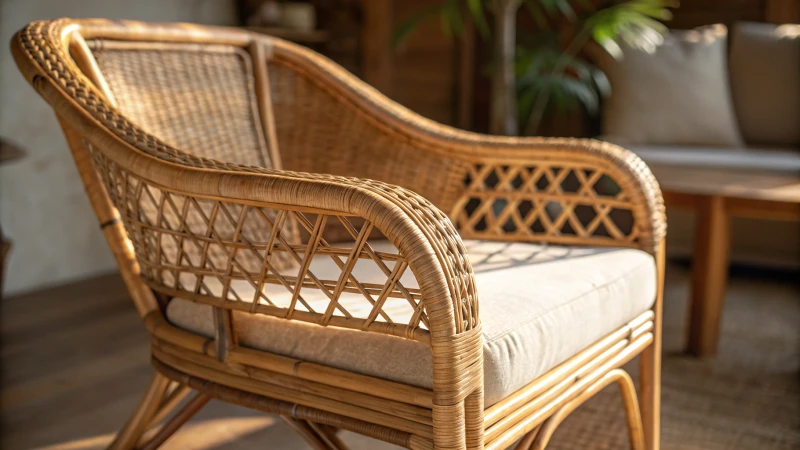
Thinking about buying rattan furniture? Let me tell you my ideas!
Rattan is famous for its beauty and versatility. But how strong is it as a material? Rattan provides a special mix of flexibility and strength. It suits many uses. This blog post explores rattan’s toughness and upkeep needs. It also compares rattan with other materials. You really want to choose well. Keep reading to find key insights on rattan’s performance in different settings. Learn how to extend its life.
I remember when I first saw a beautifully crafted rattan chair. The chair did not just grab my attention with its detailed design. It promised comfort and strength. Rattan has more than just good looks. It blends flexibility and strength in a unique way. This makes it a great choice for many uses. Still, I often wonder how it stands up to daily life. Kids and pets might put it to the test. In this blog post, I want to explore how durable rattan really is. I will also talk about its maintenance needs. I will compare rattan to other materials as well. This should help you choose the best option for your home.
Rattan is a highly durable material for furniture.True
Rattan's strength and flexibility make it suitable for long-lasting furniture use.
Rattan requires extensive maintenance to stay durable.False
Rattan is relatively low-maintenance, needing only occasional care for longevity.
What Makes Rattan So Durable Compared to Other Materials?
Do you ever think about why rattan furniture lasts for so long? I have studied this special material for years. I am really thrilled to share why it is a strong option for both inside and outside. Let’s explore!
Rattan lasts a long time because of its strong core and bendable outside. This allows it to flex without cracking. Treated rattan withstands weather and needs little care. It suits indoor and outdoor furniture and stays good for over ten years with proper care.
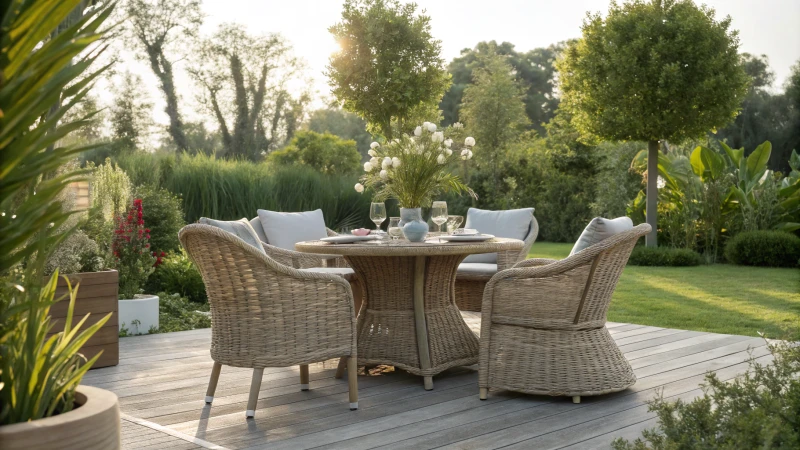
Understanding Rattan’s Unique Composition
Rattan’s strength is really fascinating compared to other materials. It has a unique composition that offers weather resistance and needs very little upkeep. The structure of rattan is made up of a solid core and a flexible outer layer, giving it strength without sacrificing flexibility.
This combination allows rattan to withstand bending and twisting, making it ideal for furniture that requires both durability and design versatility. Unlike many other materials, rattan does not crack under pressure, which is a key factor in its longevity. This resilience makes rattan furniture suitable for various environments, including both indoor and outdoor spaces.
Weather Resistance of Rattan
One of the most significant aspects of rattan’s durability is its weather resistance. Treated rattan can endure various weather conditions, making it a popular choice for outdoor furniture. Unlike wood, which can warp or rot, or metal, which can rust, high-quality rattan withstands moisture and UV rays when properly maintained.
To ensure longevity, it is advisable to look for rattan that is treated with protective finishes. Here’s a quick comparison:
| Material | Weather Resistance | Maintenance Needs | Longevity |
|---|---|---|---|
| Rattan | High | Moderate | 10+ years |
| Wood | Moderate | High | 5-15 years |
| Metal | Low | Low | 10+ years |
| Synthetic | High | Low | 5-10 years |
Maintenance Considerations
While rattan is naturally durable, it does require some care to maximize its lifespan. Regular cleaning with a damp cloth helps prevent dirt build-up. Additionally, applying a protective sealant every few years can enhance its weather resistance and aesthetic appeal. In contrast, materials like wicker may need more frequent upkeep due to their woven nature, which can trap dirt and debris.
Cost-Effectiveness and Sustainability
Rattan is also cost-effective in the long run due to its durability and low maintenance needs. When sourced sustainably, it appeals to environmentally conscious consumers who seek ethically produced materials for their projects. This focus on sustainability not only supports ecological practices but also ensures that the rattan remains a viable resource for future generations.
For more insights on sustainable sourcing, check out our guide on sustainable rattan practices1.
Rattan furniture can last over 10 years with proper care.True
With moderate maintenance and weather resistance, rattan furniture is designed to endure for more than a decade, making it a durable option.
Rattan is less weather resistant than untreated wood.False
Unlike untreated wood that can warp or rot, treated rattan offers superior weather resistance, making it more durable in various conditions.
How Can You Maintain Rattan Furniture for Longevity?
Do you want your rattan furniture to stay fresh and lively for many years? Here are some heartfelt tips to protect its charm and extend its life!
Your rattan furniture stays in good condition when you clean it often with a damp cloth. Apply UV protectants every six months. Always keep the furniture away from direct sunlight. These easy habits bring great results! Remember to apply oil every three months as well. Show love and care to your rattan furniture.
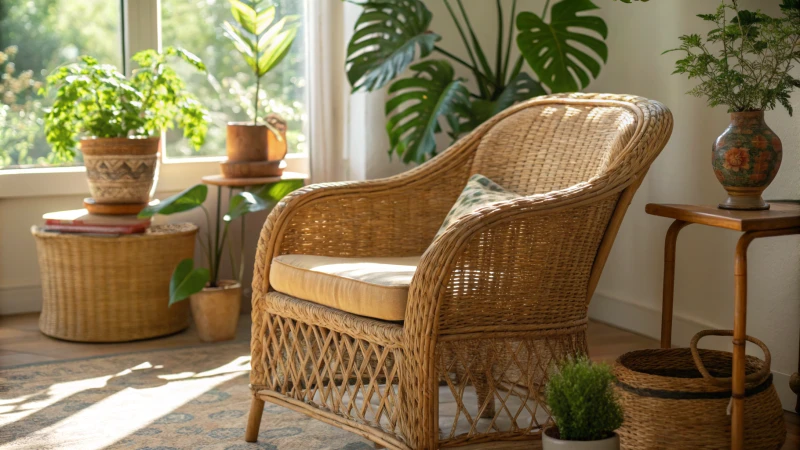
Regular Cleaning Practices
To maintain rattan furniture, regular care is essential. I learned that regular care keeps rattan furniture lasting longer. Dust can accumulate, which may lead to deterioration of the material over time. Here are some steps to follow:
- Use a soft brush to remove dust particles. A vacuum with a brush attachment can also be effective.
- Wipe with a damp cloth using mild soap. Avoid soaking the rattan, as too much water can cause it to swell or warp.
A quick wipe with a damp cloth helps a lot.
For deeper cleaning, consider using a solution of vinegar and water. This can help eliminate odors and mold.
Protective Treatments
Applying protective treatments can enhance the longevity of your rattan furniture. Consider the following options:
| Treatment Type | Description | Frequency |
|---|---|---|
| UV Protectant | Helps shield against sun damage and fading. | Every 6 months |
| Sealer | Forms a barrier against moisture and stains. | Annually |
| Oil Application | Nourishes the rattan, preventing dryness. | Every 3 months |
Applying protective treatments like UV protectants protects it even more. These treatments not only protect but also preserve the aesthetic appeal of your furniture.
Environmental Considerations
Rattan furniture should be kept in appropriate environments. Consider these factors:
- Avoid direct sunlight, which can cause fading and drying.
- Maintain humidity levels; too dry an environment can lead to brittleness.
Keeping the furniture out of harsh sunlight really helps too. Using a humidifier in dry conditions can help maintain optimal moisture levels around your rattan pieces. For more insights on protecting your furniture, check out environmental factors2.
Repairing Damage
In case of wear and tear, timely repairs are crucial:
- Tighten loose joints with appropriate tools to prevent further damage.
- Use rattan repair kits available in stores for minor breaks or cracks.
Trust me, your furniture will really appreciate it! Understanding when to seek professional help is also important. For comprehensive guides on rattan repairs, visit repair techniques3.
By following these practices, you can ensure that your rattan furniture remains beautiful and functional for years to come. For additional maintenance tips, refer to furniture upkeep4.
Regular cleaning prevents rattan furniture deterioration.True
Dust accumulation can lead to damage over time, making regular cleaning essential for longevity.
Rattan furniture should be kept in direct sunlight.False
Direct sunlight can cause fading and drying, so it's important to avoid it for better preservation.
Is Rattan Suitable for Outdoor Use?
If you enjoy designing welcoming outdoor areas like I do, you probably wonder about how practical rattan furniture is. Let’s explore if this lovely material really survives weather conditions.
Rattan is suitable for outdoor use based on the type. Synthetic rattan remains very durable against weather conditions. Natural rattan needs more care and protection. It is really important to think about your local climate before deciding. Local climate matters very much.
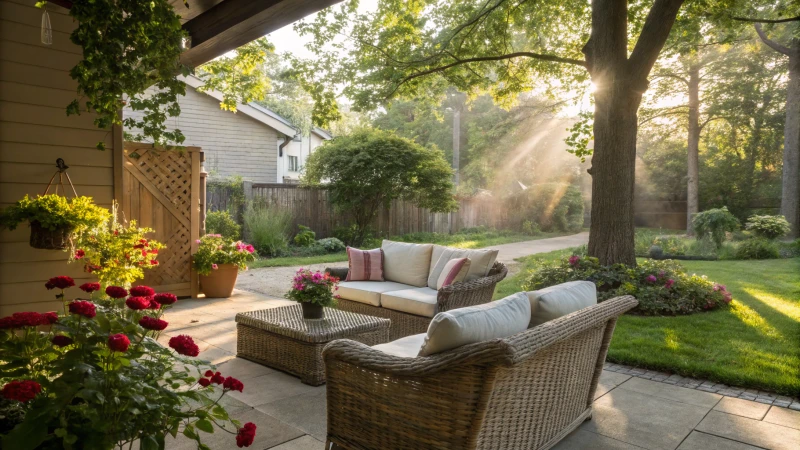
Understanding Rattan Types
Rattan comes in two primary types: natural and synthetic. Natural rattan looks stunning and brings an organic charm to any patio, transforming it into a tropical paradise. However, it is more susceptible to damage from moisture and sunlight without proper care. On the other hand, synthetic rattan is crafted from durable resin, making it perfectly suited for outdoor use as it withstands all kinds of weather without losing its beauty.
For a comprehensive comparison:
| Type | Durability | Aesthetic Appeal | Maintenance | Weather Resistance |
|---|---|---|---|---|
| Natural Rattan | Moderate | High | High | Low |
| Synthetic Rattan | High | Moderate | Low | High |
This table illustrates the trade-offs between these materials. Consider your needs before making a choice.
Environmental Considerations
I really care about sustainability, so I search for suppliers with ethically sourced rattan. Certifications like FSC5 ensure that the rattan is harvested responsibly. This is crucial not just for the environment but also for maintaining quality in your furniture. Contributing positively to the planet feels good, right? It feels really good!
Care and Maintenance Tips
If you’ve chosen rattan for your outdoor space, a little effort keeps it looking great. Here are some tips I’ve learned:
- Cushions: Choose waterproof cushions to guard against rain. They save a lot of hassle!
- Covering: Use quality furniture covers when the weather gets bad. A surprise storm taught me this lesson when my natural rattan got soaked.
- Cleaning: Clean regularly with mild soap and water to keep dirt away. Regular maintenance impressively extends your furniture’s life.
For more cleaning tips, see this guide on rattan care6.
Longevity in Different Climates
I found out that the climate affects how long rattan furniture lasts. In areas with heavy rain or bright sun, synthetic rattan performs really well as it withstands UV rays and moisture like a true champion. This becomes crucial if you want your furniture to endure through changing seasons.
If you wonder how specific climates affect rattan durability, check out this resource on climate impacts on materials7. This knowledge truly helped me make informed decisions for my home!
Natural rattan is highly resistant to outdoor weather elements.False
This claim is false; natural rattan has low weather resistance and is prone to damage from moisture and sunlight.
Synthetic rattan furniture requires less maintenance than natural rattan.True
This claim is true; synthetic rattan has low maintenance needs compared to natural rattan, making it more suitable for outdoor use.
What Are the Advantages and Disadvantages of Rattan Furniture?
Rattan furniture looks really charming, doesn’t it? The surface appears stylish. What lies beneath that look? Let’s explore the actual advantages and drawbacks together. I will also talk about my own experiences.
Rattan furniture is lightweight, sturdy and looks good. It often needs regular care to stay in great shape. Its sensitivity to weather is a concern. So, rattan furniture does not do well outside during bad weather. Knowing these good and bad points helps shoppers buy wisely. Informed choices are really important.
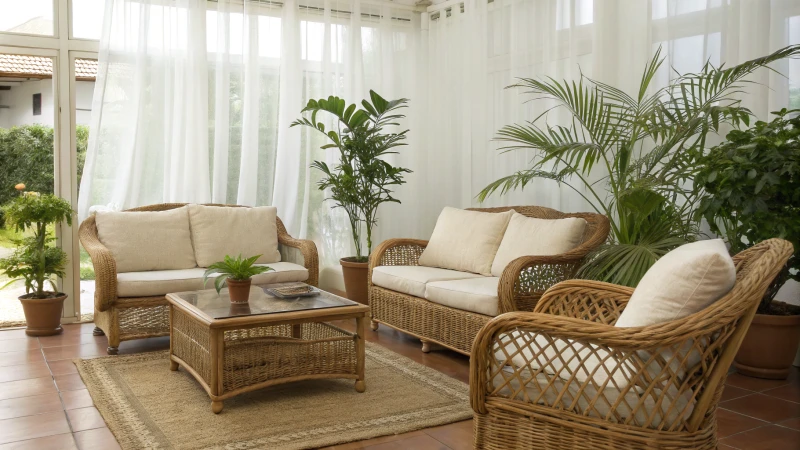
When I first came across rattan furniture, its mix of style and usefulness fascinated me. It looked like a perfect choice for my home. However, I soon discovered it has both good points and challenges. Let’s explore these together!
Advantages of Rattan Furniture
Rattan holds a special place in interior design and for good reasons. Here are some benefits I really appreciate:
-
Lightweight and Versatile: Rattan is incredibly light! I remember moving my living room around one weekend and was amazed by how easily I shifted my rattan chairs. The furniture blends well with a modern or a cozy rustic style. Learn more about rattan versatility8.
-
Durability: When cared for, rattan furniture lasts a long time. This makes it very valuable for my home. My outdoor rattan set has survived many family events and unexpected rain because of its weather-resistant finish. Explore durability tips9.
-
Aesthetic Appeal: The warm colors and detailed patterns of rattan make spaces feel inviting. I admire the textures because they truly add warmth to my home. If you love stylish interiors, you might enjoy beautiful rattan designs. Check out some stunning rattan designs here10.
Disadvantages of Rattan Furniture
However, rattan furniture has its challenges:
-
Maintenance Needs: Keeping my rattan pieces in great shape requires work. Regular cleaning and protective coatings are necessary. This is especially true for outdoor items that face the weather. Get maintenance tips11.
-
Weather Sensitivity: Rattan can struggle in harsh weather. I learned this when an untreated chair faced fading and cracking after a storm. Weatherproofing is important for outdoor rattan. Learn about weatherproofing techniques here.
-
Cost: High-quality rattan is often more expensive than plastic or metal options. It’s really an investment that pays off in style and durability, but budget-conscious buyers should weigh their options carefully. Discover budget-friendly alternatives here12.
Comparison Table of Rattan Furniture vs. Other Materials
| Feature | Rattan | Wicker | Synthetic Materials |
|---|---|---|---|
| Durability | Moderate | Moderate | High |
| Maintenance | Regular cleaning | Easy maintenance | Low maintenance |
| Weight | Light | Light | Varies |
| Aesthetic Appeal | Natural look | Traditional styles | Modern designs |
| Weather Resistance | Moderate (with care) | Low | High |
Rattan furniture is heavier than hardwood alternatives.False
This claim is false; rattan is significantly lighter than many hardwoods, making it easier to move and rearrange.
Rattan furniture requires regular maintenance for longevity.True
This claim is true; rattan needs regular cleaning and protective coatings to maintain its appearance and durability over time.
Conclusion
Explore the durability of rattan furniture, its maintenance needs, weather resistance, and how it compares to other materials for informed buying decisions.
-
Discover comprehensive insights on rattan’s durability compared to alternatives to make informed purchasing decisions. ↩
-
Explore expert insights on preserving your rattan furniture’s quality and aesthetics over time. Discover actionable tips that can make a difference. ↩
-
Learn about effective cleaning methods and protective treatments that can extend the life of your rattan items. ↩
-
Find detailed guides on repairing damaged rattan furniture, ensuring it remains in top condition. ↩
-
Discover how different types of rattan perform outdoors and learn maintenance tips to extend the life of your furniture. ↩
-
Explore the impact of weather on rattan materials to make an informed choice for your outdoor furniture. ↩
-
Learn about sustainable sourcing of rattan and why it matters when selecting outdoor furniture materials. ↩
-
Discover the benefits and potential drawbacks of rattan furniture to ensure you make an informed choice for your home or office. ↩
-
Find detailed insights on maintaining rattan furniture to prolong its life and appearance. ↩
-
Learn about alternatives to rattan that might suit your needs or preferences better. ↩
-
Explore weatherproofing techniques for rattan furniture to protect your investment against the elements. ↩
-
Understand the cost implications of buying high-quality rattan versus other materials. ↩

